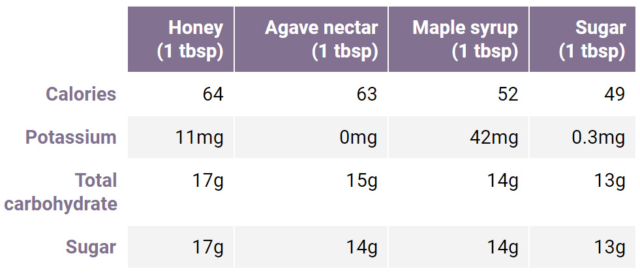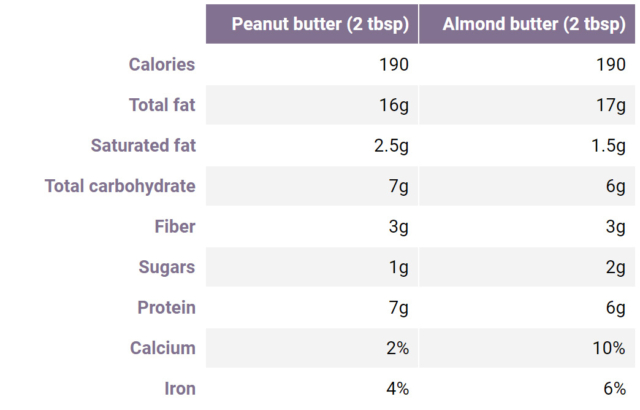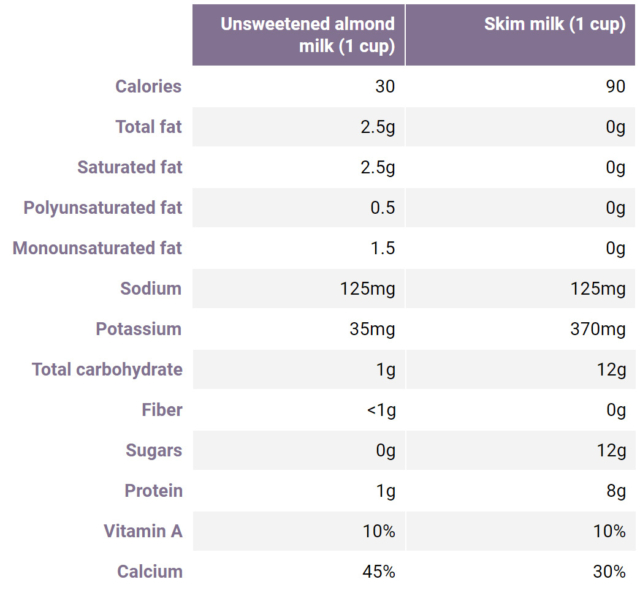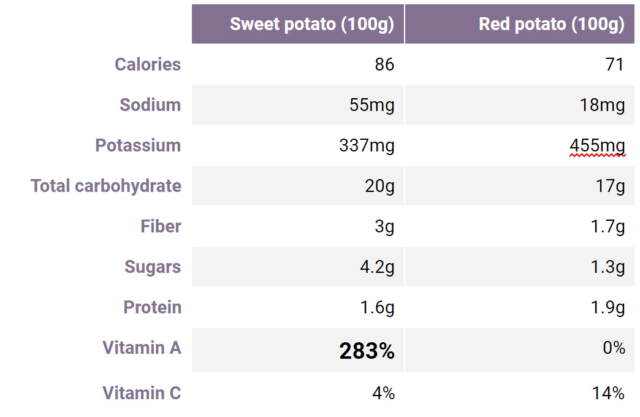Six ‘healthy’ food swaps you can skip
By Christine Stiparo
We choose the foods we eat for a variety of reasons. Taste and convenience seem to top most of our lists, but healthfulness, enjoyment, and affordability are part of it

too. We all have different needs, and knowing what those are and how to fill them is the best way to a healthy lifestyle.
However, a lot of the nutritional “advice” we get makes it seem like there is only one true way to be healthy. We’re given lists of “good” foods to eat and “bad” foods to avoid, and expected to follow it to a T.
The problem is that a lot of this advice is nonsense!
It can be hard to know which recommendations to

Christine Stiparo
follow, so below are some of the most common ones that you can safely ignore.
1| Coconut oil instead of olive oil
Here’s the thing about coconut oil: the research on its effect on humans is very limited. It may be better at initially raising our HDL (good) cholesterol and lowering our LDL (bad) cholesterol, but we don’t yet know the long-term effects. It’s possible it could also help with memory and increase metabolism, but the evidence just isn’t there yet.
What we do know is that the American Heart Association advises against using it because it increases LDL cholesterol, a known risk factor for heart disease. We also know that while a type of fat (medium-chain triglycerides, or MCTs) in coconut oil can increase metabolism and boost weight loss, most coconut oils don’t have a high enough concentration to produce any real results.
Bottom line: When it comes to oil, the thing to remember is that all oil is a significant source of calories. One tablespoon, regardless of type, contains about 120 calories. Using coconut oil occasionally in cooking or baking is perfectly OK, but eating it straight probably won’t provide any health benefits, and could potentially contribute to weight gain.
2| Liquid sweetener instead of refined sugar
Honey, agave nectar, and maple syrup. They’re all promoted as healthier than refined sugar, but how do they compare when we check out their nutrition labels?

All 4 are pretty similar, with only very slight differences in the amount of calories, potassium and sugar. And as you can see, refined sugar actually has the lowest amount of calories per tablespoon.
Now, honey and maple syrup do have more antioxidants than refined sugar, however the difference is so small we’d have to eat A LOT to get any health benefits. This study points out that subbing in sugar alternatives could increase our daily antioxidant intake by the amount found in one serving of berries. However, they base this calculation on an intake of 130g refined sugar per day.
130g of sugar per day!
That’s over 10 tablespoons of sugar! Instead of switching to honey or maple syrup, we’d be much better off simply eating less sugar and actually eating a serving of berries every day.
Agave nectar is another sugar substitute that’s been praised for it’s supposed health benefits. It’s low in glucose, which means it won’t spike our blood sugar as much as other sweeteners. However since it’s high in fructose, there’s a worry that eating too much could lead to fatty liver and diabetes. It’s still up for debate whether fructose is worse for us than glucose, but it’s pretty clear that large quantities of either aren’t particularly good for us.
Bottom line: Any type of sweetener will add sugar to your diet. None are considered a good source of nutrients, so choose one based on taste, availability, and price. It’s more important to pay attention to how much added sugar you get on a daily basis. Aim to get less than 2-3 tablespoons (25-38g) per day.
3| Sea salt instead of table salt
While sea salt is touted as a healthier alternative to table salt, the sodium content of both is virtually the same. The table below shows that a teaspoon of sea salt has 45mg less sodium than table salt. This difference is most likely due to sea salt being course, meaning less of it can fit in the measuring spoon.

Sea salt can have trace minerals such as potassium, iron and zinc, however the amounts are so small that we’d have to use a lot for it to really make a difference.
Bottom line: Either one is fine to use, and any trace minerals found in sea salt can also be found in much larger quantities in other foods. Instead of worrying about choosing the “healthiest” salt option, focus instead on your total daily sodium intake. Ideally it should be less than 2,300mg per day.
4| Almond butter instead of peanut butter
I have to say, I honestly don’t know where all the peanut hate comes from. The health benefits of almonds, walnuts and cashews are promoted to no end, but peanuts are treated like the black sheep of the nut family!
Could it be almond butter manufacturers spreading this misinformation to increase product sales? Or maybe there’s a general fear of peanuts due to an increase in peanut allergies?
Either way, almond butter seems to be the go-to nut butter spread for health enthusiasts and gurus alike. But does it live up to its reputation?

As you can see, there really isn’t much of a difference between peanut butter and almond butter. Saturated fat, carbs, protein, and calcium vary slightly, however the differences are pretty minimal.
Bottom line: When choosing a nut butter, it’s best to base it on allergies first, then cost and/or taste preferences. Also look for brands that don’t have sugar or oil listed in the ingredients list.
5| Almond milk instead of cow’s milk
Oh dairy, possibly the most misunderstood of the food groups. It’s blamed for everything from breakouts and inflammation to PCOS, and it’s one of the first things cut when we’re trying to be “healthy”.
But is all the dairy hate justified? And is almond milk actually a healthier alternative?
While there is some research showing a relationship between acne and dairy, it doesn’t show that dairy actually causes acne. Research has also shown dairy to be associated with anti-inflammatory properties. There’s also very limited research on the connection between dairy intake and PCOS, however Angela Grassi, MS, RDN, LDN does a great job at breaking down what the research says here.
Avoiding dairy isn’t necessary for most of us, however some of us do still choose almond milk for various reasons. Let’s see how they compare:

As you can see, unsweetened almond milk does have less calories and sugar than skim milk. If you’re looking to reduce your calorie or sugar intake, almond milk is a good choice. However if you need more protein or potassium, cow’s milk would be the better option. Additionally, almond milk is more expensive but tends to last longer in the fridge once opened.
Bottom line: Both almond milk and cow’s milk can work for your diet, it depends on your needs, preferences and lifestyle.
6| Sweet potato instead of white potato
For some reason sweet potatoes are seen as the ultimate superfood, while white potatoes are seen as nothing more than sugary trash. It could be the vibrant orange color that makes them seem more appealing. Or maybe it’s because we’re constantly told to “avoid white foods”. Either way, sweet potatoes have been enjoying their elevated status for a while now.
But what does their nutritional breakdown actually show us?

Turns out, there isn’t much of a difference between the two. Yes, sweet potatoes have more vitamin A and slightly more fiber, however the rest of the nutrients are pretty similar.
And check out that carb content! People insist sweet potatoes are better for blood sugar management, but they actually have MORE carbs than white potatoes.
Bottom line: If you really need some extra vitamin A, a sweet potato is a great choice. Otherwise, choose which one you want based on taste and preferences.
Guest Food, Nutrition, and Your Health columnist Christine Stirparo is a Registered Dietitian Nutritionist and Certified Dietitian. Christine is a nutrition coach, blogger, and founder of Master Your Nutrition LLC. She works with individuals struggling with bingeing and overeating, and blogs about creating positive, permanent changes in health habits and behaviors. She completed her training through the University of Delaware and now practices in Seattle, Washington. Follow her on Instagram, Pinterest, and Facebook to learn things like how to create more time for healthy meals and how to end late night snacking for good!





















